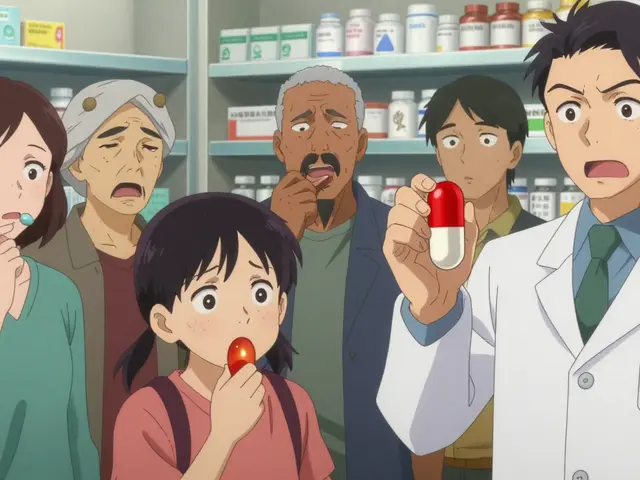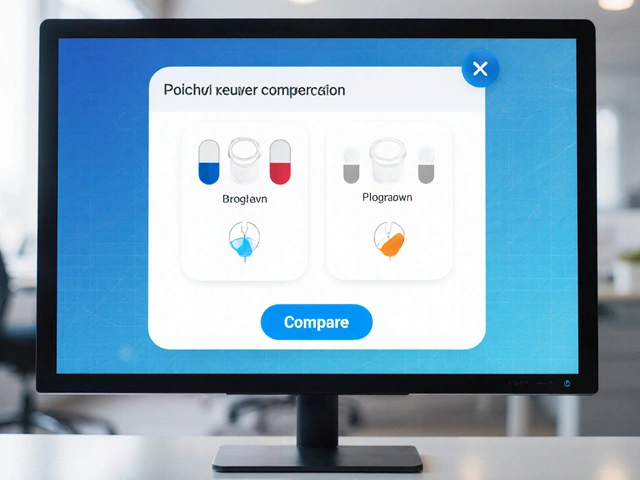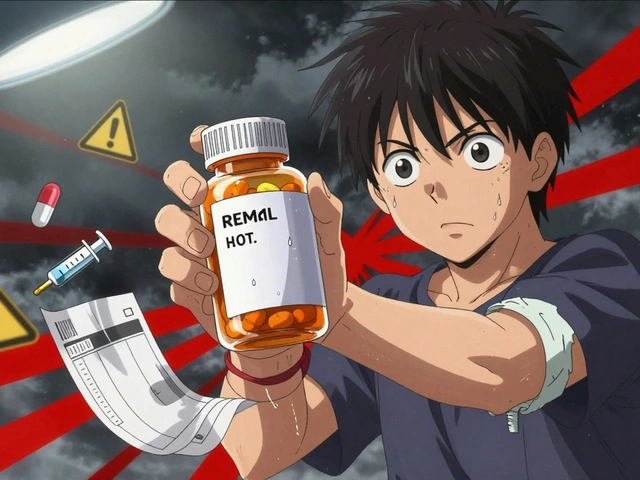Life with pheochromocytoma isn't just about dealing with the condition itself—it's about managing the stress that tags along. When your body pumps out excess adrenaline, stress can get cranked up to eleven. But hey, it's not all doom and gloom. You can still find ways to keep your cool.
First things first, get to know what you're up against. Pheochromocytoma is a rare tumor of the adrenal glands that can hike up your body's stress response. So, knowing how it works gives you a fighting chance of managing it.
Stress isn't just 'in your head.' It's a whole-body rollercoaster, especially with pheochromocytoma. That extra adrenaline can make your heart race and your blood pressure soar. Learning to manage this stress is like adding a toolkit to your arsenal.
- Understanding Pheochromocytoma
- The Impact of Stress
- Practical Stress Reduction Techniques
- Lifestyle Adjustments
Understanding Pheochromocytoma
Pheochromocytoma might be a mouthful, but it's crucial to get a grip on what it means if you're living with it. Essentially, we're talking about a rare tumor that grows in the adrenal glands, those little glands sitting atop your kidneys. These glands are in charge of producing hormones like adrenaline, the same stuff that kicks in when you're stressed.
These tumors can crank out high levels of these hormones, causing symptoms like high blood pressure, headaches, rapid heart rate, and sweating—basically what you feel in high stress but on steroids. Not everyone with pheochromocytoma shows all symptoms, and detecting it can be tricky without medical tests.
What's the Big Deal About Hormones?
The hormones produced by this tumor, mostly adrenaline and noradrenaline, are part of your body's fight-or-flight response. Your body thinks you're in fight mode even when you're just chilling on your couch. This makes managing stress a big deal since these hormones can lead to episodes that are more than just uncomfortable—they can be downright dangerous.
Getting Diagnosed
Diagnosis can often feel like detective work. Doctors usually run a combination of blood and urine tests to spot excess hormones. Imaging tests like CT scans or MRIs might be in the mix too, to pin down where the tumor is hiding.
If you're nodding along thinking, 'This sounds familiar,' don't skip on seeing a healthcare professional. Proper diagnosis is key to sorting out treatment plans which can effectively manage symptoms and reduce the risks associated with the condition.
The Impact of Stress
Living with pheochromocytoma can feel like having your foot stuck on life's gas pedal. Stress doesn’t just mess with your mind; it sends your body into overdrive, often exacerbating the symptoms. The adrenal glands, home to these pesky tumors, start producing excess hormones like adrenaline and noradrenaline. This can lead to fluctuating blood pressure, headaches, and rapid heart rate—stuff straight out of a stress horror film.
Understanding how stress works can give you the upper hand. When you're stressed, your body's 'fight or flight' response kicks in. It’s like nature’s way of getting you ready to face a lion, only you're just sitting in traffic or working on a tight deadline. For someone with pheochromocytoma, this response can be amplified, leading to more intense symptoms.
Physical and Emotional Effects
The stress from pheochromocytoma isn't just physical. Emotionally, it can make you feel like you're on a constant merry-go-round of anxiety and fear. It's not uncommon for people to experience mood swings, fatigue, or even depression when they're in the throes of dealing with it.
The trick is learning to manage this stress effectively. Recognizing the signs early—like feeling edgy, getting easily irritated, or just plain exhausted—can help you nip stress in the bud before it spirals out of control.
The Bigger Picture
The wider impact of stress on your life can't be overstated. It affects sleep, relationships, and even how you approach daily activities. Have you noticed that during stressful periods, things that were once enjoyable now seem irritating or unmanageable? That’s the adrenaline talking.
Bringing stress down a notch isn't just about finding peace of mind. It’s about controlling symptoms and improving overall health. Whether through coping strategies or lifestyle changes, lowering stress levels can lead to fewer episodes of high blood pressure and a better overall experience living with the condition.

Practical Stress Reduction Techniques
Living with pheochromocytoma puts your stress levels under a microscope. So, finding ways to relieve stress isn't just nice; it's crucial. But what's practical and doable? Let's break it down.
Mindfulness and Meditation
Meditation isn't just for monks, folks. Regular practice can help chip away at stress. Think of it as hitting pause on your brain's stress factory. Just 10 minutes a day can make a difference. There are tons of apps out there to guide meditation, making it super accessible.
Breathing Exercises
Breath in, breath out. No kidding, deep breathing can really help. Try this: inhale through your nose for a count of four, hold for four, and exhale for four. Repeat several times a day. It tells your body to chill and can help keep those hormone spikes in check.
Exercise Smartly
Exercise is a stress-buster, but you have to play it smart with pheochromocytoma. Focus on low-impact activities like walking or yoga. They help unload stress without overloading your adrenal glands.
Balanced Diet
Food can be your friend or foe. Aim for a balanced diet rich in fruits, veggies, lean proteins, and whole grains. Avoid caffeine and heavy sugar. They can send your stress levels through the roof.
Regular Sleep Schedule
Consistent sleep isn't just about bagging beauty rest. It's a core component of managing stress. Set a regular bedtime, and stick to it—weekdays and weekends. It helps stabilize those adrenaline surges.
Lifestyle Adjustments
Alright, let's talk about lifestyle adjustments. When you're living with pheochromocytoma, there are some tweaks you can make to keep stress levels in check and life running a bit smoother. These aren't radical changes, but they can make a world of difference in how you feel day to day.
Diet Tweaks
Focus on a diet that's balanced and low in stimulants. High caffeine? That's a no-go. It can spike your adrenaline even more. Instead, try herbal teas. Foods rich in potassium, like bananas and sweet potatoes, can help manage blood pressure—key for coping with this condition.
Routine Exercise
Exercise is a double-edged sword here. It's important but needs to be moderate. Think activities like walking, swimming, or yoga. You don't want to go overboard with high-intensity workouts because they can stress your system.
Sleep is Your Friend
Getting enough sleep? It's crucial. Inadequate sleep can add to stress levels. Aim for a solid 7-9 hours every night. A consistent bedtime routine can signal your body it's time to wind down. Consider dimming lights and ditching screens an hour before bed.
Mindfulness and Relaxation
Integrating mindfulness techniques into your daily routine can be a game-changer. Simple practices like deep breathing or guided meditation help manage ongoing stress. They don't demand too much time, just a bit of patience.
Keep Track
Keeping a journal might sound cliché, but it works wonders. Note down your triggers, symptoms, and how you cope. Over time, you'll notice patterns and learn what lifestyle adjustments truly help you manage those hormone spikes.
| Food Type | Recommended | To Avoid |
|---|---|---|
| Drinks | Herbal Teas | High-Caffeine Drinks |
| Fruits | Bananas | Reduces |
| Vegetables | Spinach | N/A |
Remember, everyone's experience with pheochromocytoma can vary, so it's all about finding what works best for you. Always listen to your body and consult with healthcare professionals for tailored advice.






Nina Vera
July 18, 2025 AT 15:40Wow, living with pheochromocytoma sounds incredibly tough! I can't even imagine having to manage hormone-induced stress on top of everything else. This article is a lifesaver though, breaking down some real strategies that can help. Does anyone know if these lifestyle adjustments are easy to maintain long-term? Because honestly, sticking to new habits can be its own form of stress sometimes.
The mindfulness techniques part caught my eye. Has anyone here tried meditation or yoga specifically for this condition? I'd love to hear what actually works because meditation apps always feel a bit gimmicky to me.
Suzanne Podany
July 19, 2025 AT 23:20Thanks for starting this convo! Living with such a rare condition often feels isolating. What helped me and many others is focusing on small, manageable changes rather than overhauling everything at once. For example, adjusting the diet by incorporating stress-reducing foods gradually rather than all at once makes a significant difference.
And yes, about the mindfulness techniques, it’s not just about sitting still—deep breathing, mindful walking, and gentle stretches can be more realistic daily practices. The key is consistency and finding what resonates personally.
Support groups, whether online or offline, can also be a huge help. Connecting with others who understand the unique stress pheochromocytoma produces has saved me on many tough days.
Steve Ellis
July 21, 2025 AT 14:13I wanna echo what Suzanne said about support groups—they’re truly invaluable. Stress from hormone imbalances can spiral if you're tackling it solo. Sometimes just hearing others' journeys and coping styles sparks hope and new ideas.
Regarding diet and lifestyle tweaks, it’s important to coordinate with healthcare providers to avoid any conflicting advice, especially with medications. The heart palpitations and blood pressure swings from pheochromocytoma aren’t something to take lightly, so targeted stress relief can really complement medical treatment.
Mindfulness, while a buzzword nowadays, can really reframe how one experiences anxiety. I've worked with clients who found that simple breathing exercises helped them manage hypertensive episodes linked to their condition.
Lindsey Bollig
July 22, 2025 AT 23:33This article is a great reminder that managing pheochromocytoma isn’t just about medical treatment but whole-person care. From my experience helping patients, integrating stress reduction into daily routines improves both emotional well-being and physical symptoms.
One particularly effective approach is creating a daily 'pause' ritual—a short time dedicated to breathing, reflection, or gentle movement—that helps ground the nervous system. Over time, this ritual becomes a powerful tool to counteract the fight-or-flight responses triggered by hormone surges.
Also, staying hydrated, limiting caffeine, and prioritizing sleep are lifestyle pillars that patients sometimes underestimate but are vital for stress management.
Christopher Stanford
July 27, 2025 AT 00:46Not gona lie, reading this kinda makes me wonder how much of the advice is just generic stress stuff repackaged for pheochromocytoma. Like, mindfulness and diet changes are good for anyone. But does it really address the crazy hormone spikes these patients get?
Also, gotta say, some of the explanations can be a bit over the top, IMO. I get that stress’s bad, but what about more aggressive treatments or newer meds to manage the biochemical side of things? Feels like this article is focused more on surface-level comfort than hardcore medical solutions.
Anyone here on the latest treatments? Would love to hear about real progress instead of just lifestyle fluff.
Michael Weber
July 28, 2025 AT 12:53Honestly, I think dismissing the psychological and lifestyle aspects of pheochromocytoma management is a huge mistake. Stress isn’t just a side effect; it’s a core component that exacerbates symptoms. The biochemical imbalance fuels anxiety and vice versa, creating a vicious cycle.
Integrative approaches combining medical therapy with targeted stress reduction actually optimize outcomes. Patients who embrace mindfulness and dietary changes often have improved blood pressure stability, which is critical. It’s not ‘fluffy’ advice, it’s scientifically grounded wellness.
Of course, ongoing research is vital, but meanwhile, patients need practical tools for daily life. This article highlights that balance well.
Jillian Bell
July 29, 2025 AT 16:40Guys, don’t you think there’s more going on behind the scenes? Pheochromocytoma is likely one part of a bigger puzzle. Why aren’t bigger pharmaceutical companies pushing harder for cures or better meds? This feels like another instance where patients are left to sift through lifestyle advice while the real systemic problems get ignored.
And mindfulness? Sure, it’s trendy, but could it be just a way to distract from the inadequacy of current treatments? I keep wondering when we’ll actually see breakthrough therapies or even prevention strategies rather than just coping tactics.
Anyone else skeptical about this approach? Is the medical system even trying hard enough?
Sunil Kamle
August 1, 2025 AT 00:13Ah, the classic skeptic view, but let me assure you—it’s not always about big pharma secrets. Some conditions pose biological puzzles that science is still unraveling, no matter the hype. Stress management, for all its simplicity, is a key pillar because the body’s response to hormone surges can be lethal if uncontrolled.
Advanced treatments come with their own limitations and risks, so empowering patients with practical, immediate tools makes scientific and humane sense. Plus, every patient’s condition is unique—mandating tailored approaches.
So, while it sounds a bit simplistic, the mindfulness and lifestyle changes are far from meaningless. They buy patients time and resilience when faced with an unpredictable condition.
Blake Marshall
August 3, 2025 AT 21:40Yeah, gotta say, Sunil’s right here. Like, not every viral headline about some miracle cure is legit. Sometimes it's all about what you do daily. I mean, sure, science needs to go on, but meanwhile, these little tweaks add up—better sleep, less caffeine, breathing exercises—it’s all the stuff people shrug off but really helps.
Side note, anyone tried those biofeedback devices? Wonder if they actually help in monitoring how stressed you are and cutting down those crazy hormone moments.
Harold Godínez
August 9, 2025 AT 02:40Great discussion here. Just to add a note on accessibility: Not all pheochromocytoma patients have easy access to specialized care or expensive treatments. Because of that, spreading awareness about manageable tweaks like diet and mindfulness becomes even more crucial.
It’s also worth mentioning that stress reduction doesn’t negate medical intervention—it complements it. Doctors usually recommend a multi-pronged approach, especially since pheochromocytoma symptoms can vary widely in intensity and frequency.
What strikes me is how everyone is looking for a magic pill when sometimes stabilization and quality of life come down to everyday choices.
Shana Shapiro '19
August 12, 2025 AT 14:00Reading this thread makes me hopeful for those battling pheochromocytoma. It’s clear that managing stress and lifestyle can be painstaking, but it’s promising to see practical strategies highlighted here.
I want to emphasize that emotional support and mental health care are just as vital. Patients dealing with rare diseases often face loneliness and anxiety that compound their physical symptoms. Therapy or counseling can be powerful allies in this journey.
Also, the importance of patience—progress is incremental, and some days will be harder than others. But small consistent efforts can lead to a vastly improved quality of life over time.
Steve Ellis
August 16, 2025 AT 15:13Thanks for adding that, Shana. I completely agree that emotional and psychological support must be prioritized alongside physical symptom management. Sometimes patients underestimate how much mental health impacts their condition outcomes.
Also, looping back to the original post and Suzanne’s comment, I think the power of community can’t be overstated. Connecting with others facing the same diagnosis often brings out coping strategies no article can cover. Shared experiences and practical advice from peers can be golden.
Has anyone here joined any patient networks or forums specifically focused on pheochromocytoma? Would love to hear recommendations.